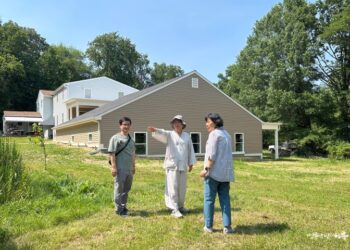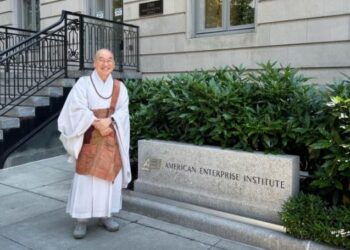Jun 7, 2025 – Return to Korea, Gyeolsa Practitioner Jaja Retreat, Mansfield Foundation, NED Meeting, Departure to the United States
Hello. Today, Sunim returned to Korea from Laos, attended the Gyeolsa Practitioner Jaja Retreat to give a Dharma talk, held consecutive meetings with guests from the United States, and then departed for the United States.
Sunim departed from Laos at 8 PM yesterday evening and landed at Incheon Airport at 5:50 AM Korean time via Ho Chi Minh Airport. He was able to sleep on the plane during the flight.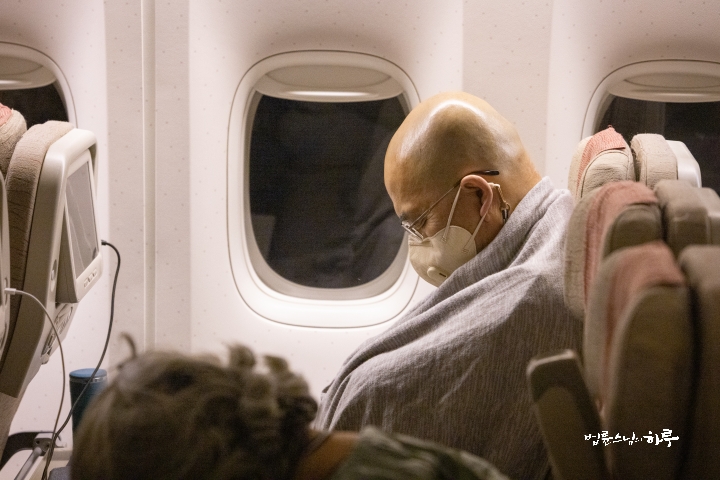
After leaving Incheon Airport, he headed straight to Seoul Jungto Center.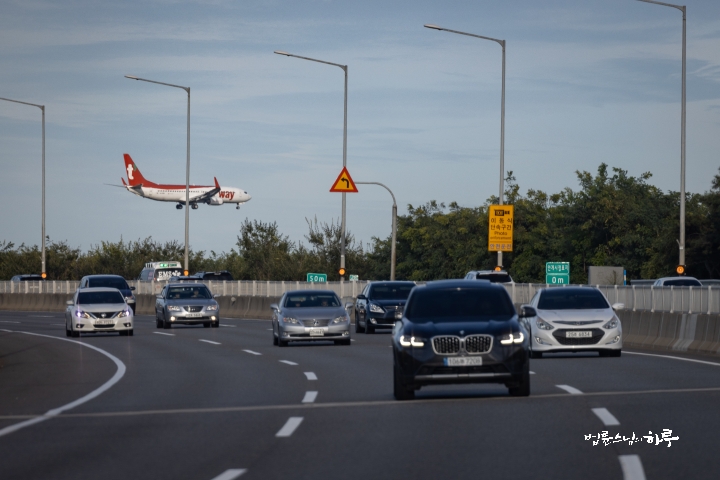
After arriving at Seoul Jungto Center, he attended the Gyeolsa Practitioner and Dharma Teacher Group Jaja Retreat from the broadcasting room at 8 AM. ‘Jaja’ is a Buddhist ritual that maintains the purity of the Sangha by asking the community to point out one’s faults. Gyeolsa practitioners and Dharma teachers gathered at each regional main temple and offered morning prayers together.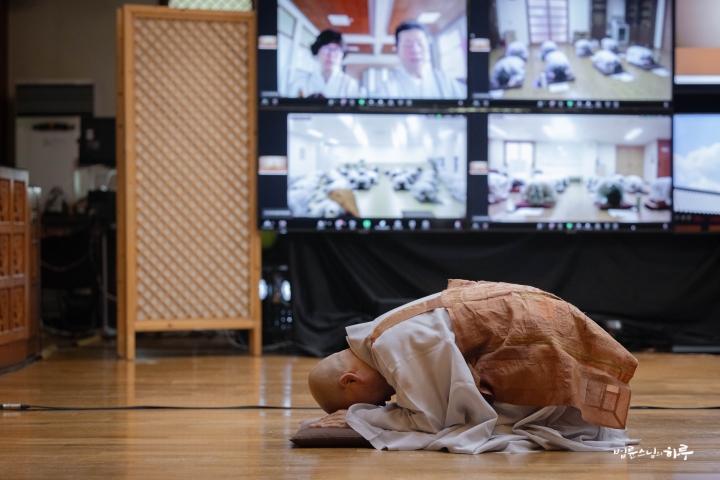
They then requested Sunim to give an opening Dharma talk for the Jaja retreat with three prostrations. Sunim first expressed his gratitude for successfully completing the 100-Day Dharma Talk and then spoke about the purpose and mindset for conducting Jaja.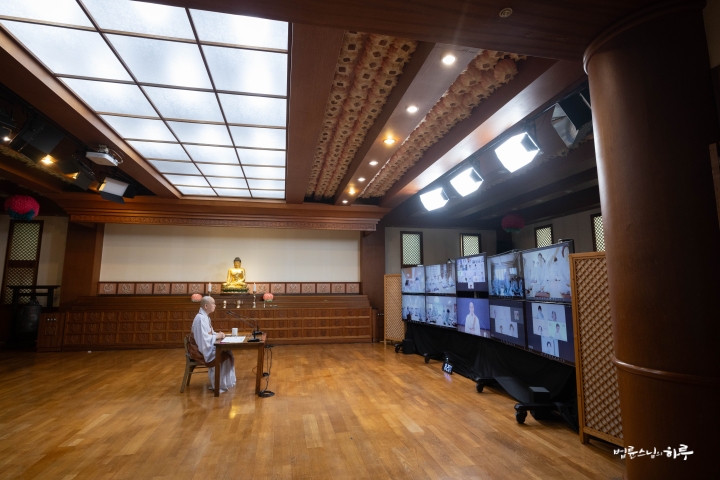
“Jungto Society has newly embarked on the second 10,000-Day Practice based on the past 30 years of history. While the first 10,000-Day Practice was a process of creating something new from nothing, the second 10,000-Day Practice can be said to be a time to bloom more widely based on the first 10,000-Day Practice. However, looking back on the past two years, it seems that Jungto Society is not yet fully prepared to grow vigorously and bloom. Therefore, we set a goal to use the first 1000-Day Practice, which marks the beginning of the second 10,000-Day Practice, as a preparatory period to strengthen our foundation by reinforcing areas that are lacking. I hope we can practice more diligently this year, the end of the first 1000-Day Practice, thinking of it as a preparatory period for widely spreading Jungto Society. With this intention, we declared 2025 as a special practice period, established a Special Practice Committee, and began the first 100 days with the 100-Day Dharma Talk. Last week, the first 100 days concluded well with the 100-Day Dharma Talk. We still have work ahead to continue practicing through the second and third 100-day periods.
What Jungto Society Must Prepare for a New Leap Forward
When we look at the situation on the Korean Peninsula, neighboring countries, and the world together, I think an environment is gradually being created where Jungto Society can expand further. With the establishment of a new government in Korea, the risk of war that had been heightened has been considerably reduced. If we handle things well now, it may become possible to establish a peace system on the Korean Peninsula. We can say that the possibility of achieving peace on the Korean Peninsula, which we have dreamed of so much, is higher than ever. In 2018, we experienced sudden progress in inter-Korean relations and mistakenly thought the situation would improve on its own, only to see it deteriorate again. So this time, we must approach with a more cautious attitude. Rather than taking two steps forward and one step back, if we carefully take one step at a time from the beginning, the possibility of the Republic of Korea developing in a better direction has increased. 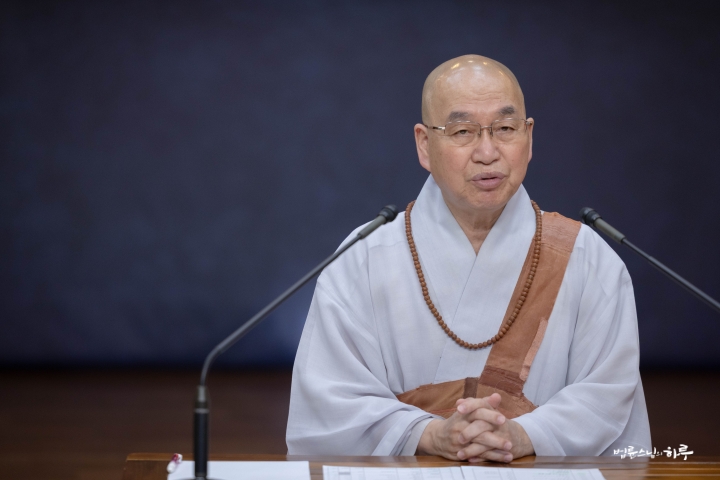
Of course, it is true that Korea’s diplomatic position has become very narrow due to U.S. President Trump’s tariff policies and changes in the international situation. However, Korea’s economic indicators have had some bubbles, and there has been an overly optimistic perspective at work. It has also been growth that was overly dependent on the United States and China. In the future, we need to diversify our trade relationships for more stable development and diversify our relationships with Southeast Asia, the Middle East, Europe, and others. I hope those who manage the country will become aware of these aspects through this series of situations. Citizens also need to move away from the mindset of ‘just following what America wants us to do.’ Since the United States is also showing a self-centered, selfish attitude, we must also take a pragmatic approach. Additionally, our economic growth so far has largely relied on China’s growth. This could become a major threat to us in the future. Therefore, we must approach our relationship with China very carefully. Inter-Korean relations must also be handled cautiously. With Japan, we need mutual cooperation for the future, overcoming past grievances. Rather than promoting excessive anti-Japanese sentiment, we should pursue a friendly strategy that emphasizes practical benefits.
Furthermore, in the era of climate crisis, it is not desirable to pursue economic growth blindly. In the future, we must move away from growth-centered economic policies and move toward a country where everyone can live well through eco-friendly policies and fair distribution. We must also develop into citizens who share responsibility for the climate crisis. The direction of Jungto Society also aligns with these goals. The path that Jungto Society pursues and the path our country takes are not separate. When our country moves forward in the direction that Jungto Society pursues, our country will develop and peace will come to humanity. Moreover, it will help overcome the climate crisis. Nationally, sustainable development is possible if we just adjust our perspective slightly. Looking down from a higher dimension, there is no need to divide into factions and fight. If we maintain our center well, national unity is also possible beyond division.
The same applies to the Buddhist community. Currently, most first-generation Buddhist leaders in the international community have passed away due to old age. One or two remain alive, but even they are barely able to be active. In this situation, Jungto Society’s activities are suggesting the direction Buddhism should take in the international community. In other words, Jungto Society is in a position to have a positive influence on the Buddhist community outside of Jungto Society. 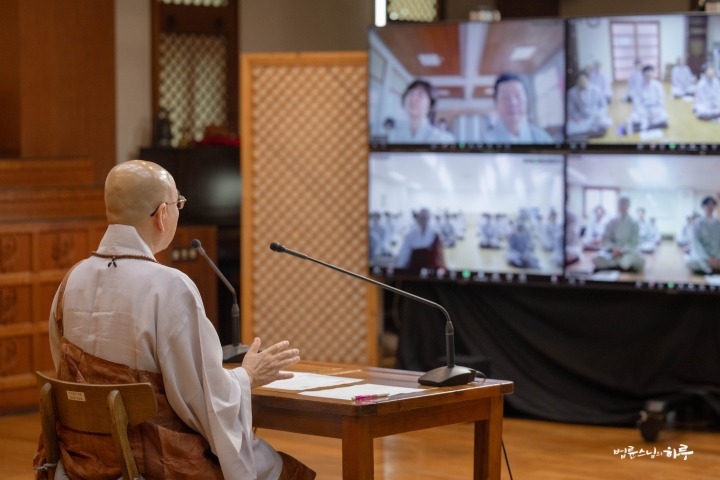
What Jungto Society needs most right now is not financial resources but human resources. Since all activities of Jungto Society are carried out through volunteer work, we cannot solve problems by spending money on labor costs. Therefore, what is more urgent than finances is recruiting personnel. I ask that Dharma Teachers who counsel and train talent pay great attention to this issue.
The Moment You Open Your Heart Wide, Suffering Disappears
When you open your heart a little more actively, there are actually no big problems in the world. Creating suffering with a negative mindset and then trying to resolve that suffering through prostrations, meditation, and various other methods is not efficient. If you view things broadly and positively and open your heart wide, minor afflictions will naturally disappear. You might think, ‘That person is the problem,’ but if I apologize or embrace them broadly, it’s really not a big deal. When the heart is closed, even a speck of dust can cause conflict, but when you open your heart wide just once, it becomes nothing at all. While Posal and Jaja (Posadah and Pravarana-confession and recitation of the monastic rules), which remove specks one by one, are important, actively opening your heart as a bodhisattva, a Mahayana practitioner, is also very important. While keeping precepts is central in Theravada Buddhism, in Mahayana Buddhism, ‘aspiration’ – opening one’s heart wide – is the life of practice. 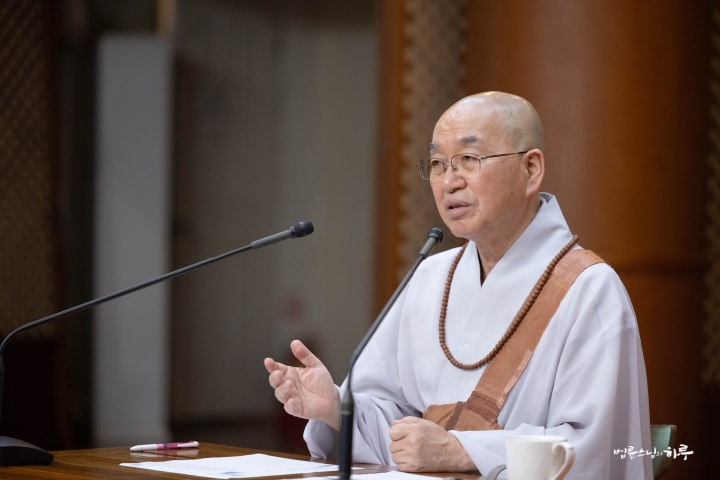
Posal(Posadah)and Jaja(Pravarana) are practices that reveal and correct one’s faults from a Theravada perspective to secure purity. However, if we adopt an attitude of aspiration by opening our hearts wide, this too can be a great source of strength in our practice. A bodhisattva, that is, a Mahayana practitioner, is ‘a good man or good woman who has aroused the mind of Anuttara Samyak Sambodhi.’ A bodhisattva is not someone who rejects the world but someone who embraces it more broadly, looks far ahead, and moves forward. This is precisely the Mahayana view of practice.
Today marks our observance of Posal and Jaja for the first time in six months. Please examine yourself well in a comfortable posture and then reveal and repent. Consider the advice offered by fellow practitioners as gifts and fully accept them as an opportunity to purify yourself. Please observe and advise each other with a heart that cares for fellow practitioners, not with a critical mind. After completing Posal and Jaja, I will speak with you again.” 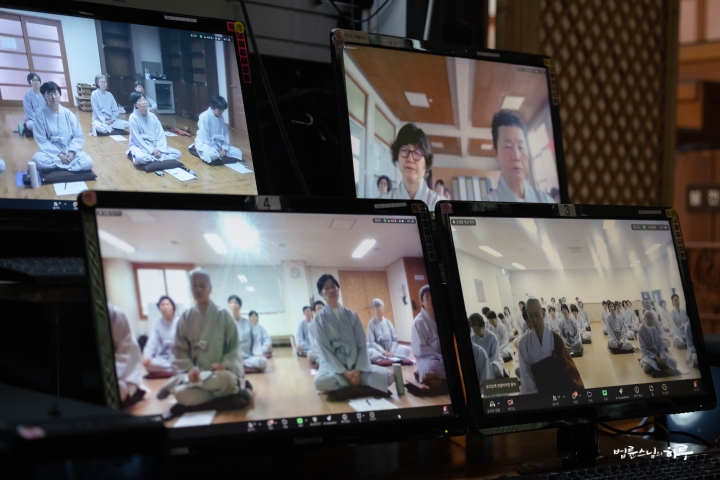
Next, the groups began their Jaja practice. After repenting according to the 40 precepts for Jungto practitioners, each person requested Jaja from their group members.
“If you have any doubts about my words and actions, or if there is anything you would like to tell me for my practice, I request your Jaja for my benefit.”
While the Gyeolsa practitioners and Dharma Teachers conducted their Jaja practice, Sunim headed to the Peace Foundation.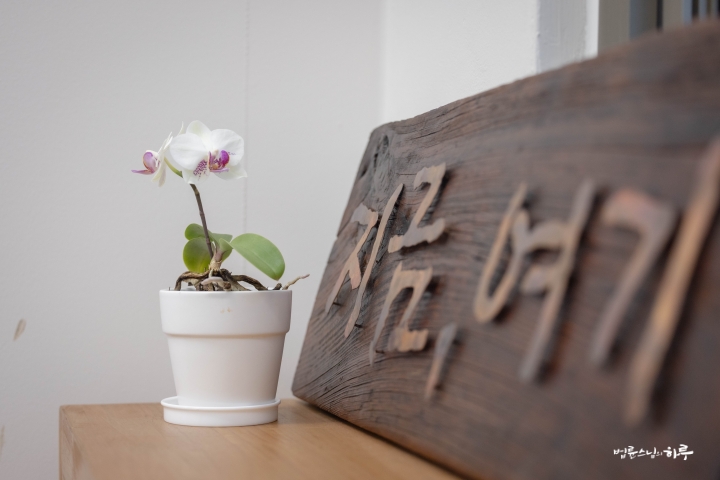
At 10 AM, Frank Jannuzi, President of the Mansfield Foundation, and his delegation visited Korea and came to see Sunim.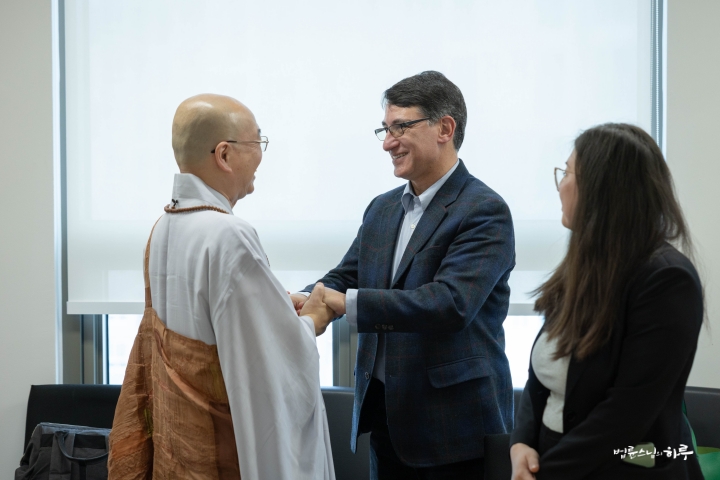
“Nice to meet you. You look very good.”
“I also just returned from Laos.”
Frank Jannuzi served as an aide when former Democratic President Joe Biden was Chairman of the Senate Foreign Relations Committee. Based on his long experience working on the Senate Foreign Relations Committee, he continues to provide various policy advice to the Democratic Party. They exchanged warm greetings.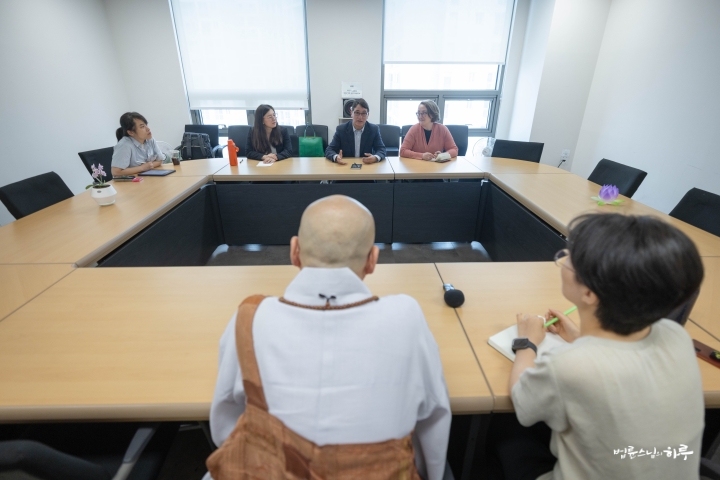
“How long have you been in Korea?”
“About a week. I’ve met with experts from both progressive and conservative sides, as well as those who worked in previous and current administrations. It’s been a very meaningful time.”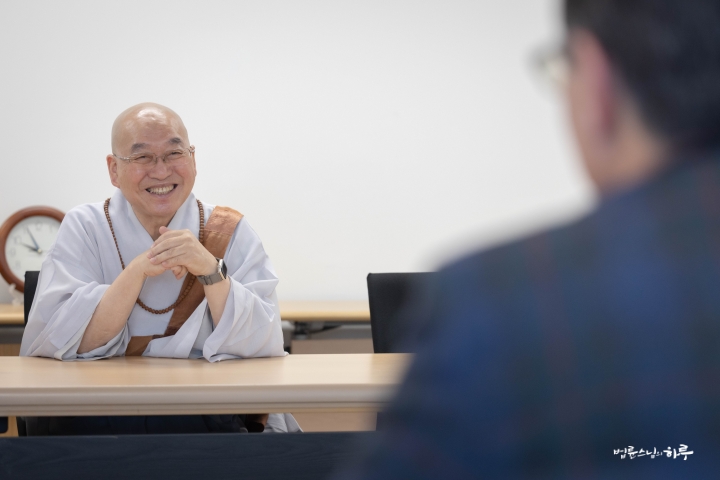
“We’re usually close, but the seats we’re in now are too far apart. Let’s move to a different place and have our conversation.”
“Okay, let’s do that.”
Sunim moved to the reception room to have a face-to-face conversation at a closer distance. First, Sunim presented a small gift to Mr. Jannuzi. Mr. Jannuzi also gave a gift to Sunim.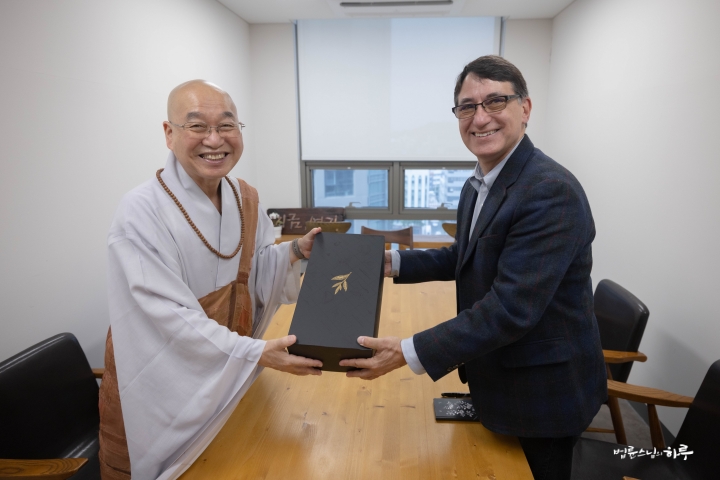
They then began their conversation in earnest. Mr. Jannuzi asked Sunim various questions about how U.S. policy toward North Korea should change to improve U.S.-North Korea relations. Sunim emphasized that North Korea policy should change to match the changed circumstances.
What Diplomatic Strategy Should the Lee Jae-myung Government Take Between the United States and North Korea?
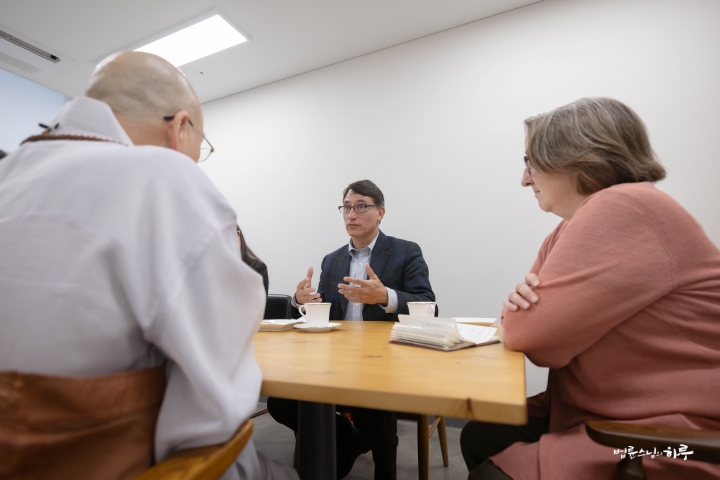
“Currently, the Lee Jae-myung government believes that the Yoon Suk-yeol government has ruined inter-Korean relations, so they will expect to be able to restore inter-Korean relations from now on. They will likely make proactive proposals on August 15th Liberation Day and attempt to send a special envoy to North Korea. However, the North Korean government is very unlikely to accept such proposals because they believe the South Korean government has no role to play at present.
Therefore, I hope the Lee Jae-myung government doesn’t rush to improve inter-Korean relations. Now is a more important time to calm the division of public opinion within South Korean society and achieve national unity. Rather than South Korea taking the lead in improving inter-Korean relations, it would be better to quietly support the improvement of U.S.-North Korea and Japan-North Korea relations from behind. The current conditions don’t allow South Korea to lead the improvement of inter-Korean relations. However, I’m most concerned that security officials in the new government will want to try to resolve the stalled inter-Korean relations.
Moreover, conservative forces in South Korea are likely to interfere with improving U.S.-North Korea relations by criticizing that ‘North Korea and the United States are bypassing South Korea to improve relations.’ Naturally, the South Korean government may want to be at the center of solving problems. However, the current reality doesn’t allow for this. Rather, to solve the problem well, it’s necessary to step back and support the improvement of U.S.-North Korea relations. What I’m worried about is whether the Lee Jae-myung government can do this.”
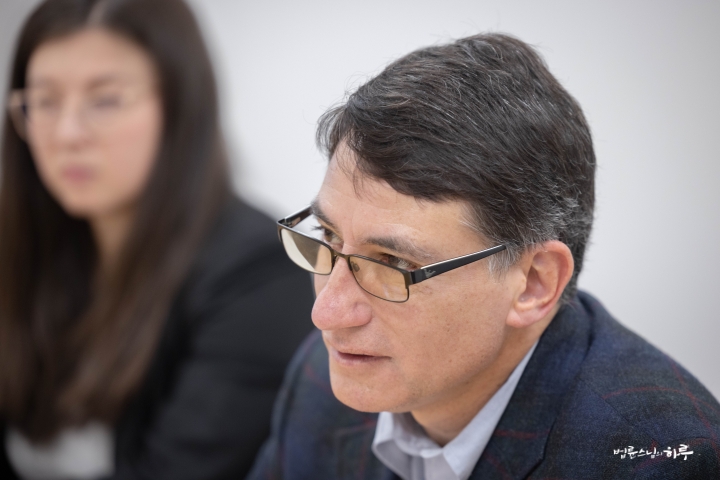
“At first glance, President Trump seems to pursue economic interests, but in my view, his desire to show off achievements with an attitude of ‘only I can solve the problem’ seems even greater. So the Lee Jae-myung government should propose to President Trump like this:
‘For 72 years since the Korean War Armistice Agreement, no one has been able to solve the peace issue. No U.S. president in history has been able to solve it. Only you can solve this problem. If you solve this problem, you will make a great contribution not only to the United States and Korea but to humanity. If you decide to solve this problem, the Korean government will actively support you.’
If the Lee Jae-myung government takes this perspective, the problem can be solved more easily. President Trump won’t be pleased if the South Korean government tries to take the lead in solving problems. Such personal tendencies are also very important in diplomatic relations. In reality, ending the Korean War is something the United States must take the lead in solving, not something South Korea can solve. If the United States takes the lead in solving the problem, the Lee Jae-myung government can also avoid being misunderstood as pro-North leftists.
North Korea’s situation also doesn’t allow for dialogue with South Korea right now. North Korea currently defines inter-Korean relations as relations between two hostile states. This cannot be changed immediately. So my proposal is this:
‘Let’s change from two hostile state relations to two cooperative state relations.’ 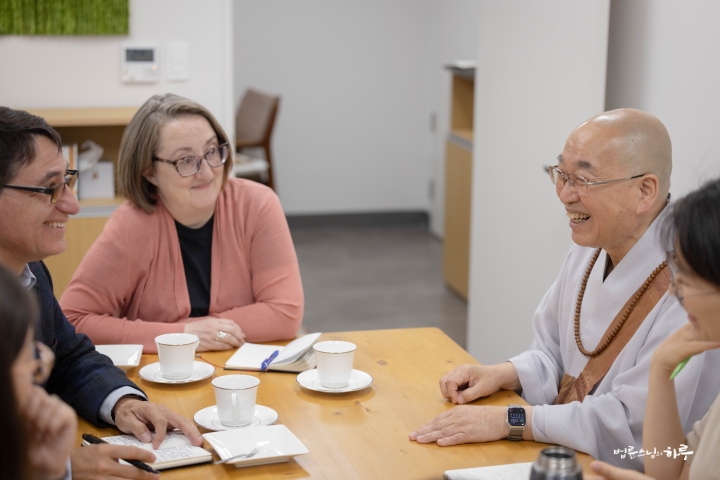
This proposal is not about unifying into one nation like in the past, so it can be implemented immediately without changing North Korea’s current policies. Since North Korea’s position has changed, we must seek a better path based on this changed reality.”
Mr. Januzi also asked about the North Korea policy that the United States should adopt.
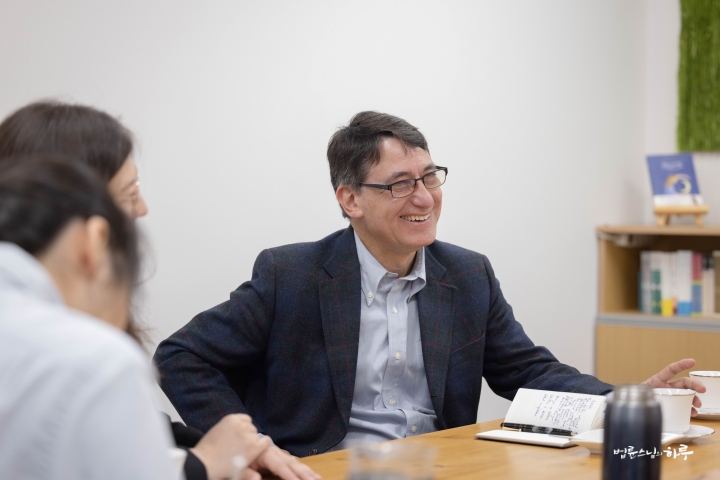
“The United States and North Korea currently do not have normalized relations. When South Korea and North Korea simultaneously became UN member states in 1991, Russia and China established diplomatic relations with South Korea. At that time, the United States and Japan should have also established diplomatic relations with North Korea. However, the United States and Japan did not do so. Therefore, this issue did not arise because of nuclear development. In this regard, if the United States wants to improve relations with North Korea, it should engage in dialogue with ‘normalization of relations’ as the topic, not denuclearization. Of course, denuclearization can be discussed as a condition for normalizing US-North Korea relations. However, the normalization of US-North Korea relations must be the core topic of negotiations, not denuclearization as a precondition for negotiations. The moment denuclearization is set as a precondition for negotiations, dialogue itself becomes impossible.
The topic of dialogue should be ‘normalization of US-North Korea relations.’ This means that dialogue should begin based on the 2018 Trump-Kim Jong-un Singapore Summit. Of course, from the US perspective, it can demand North Korea’s denuclearization for normalization of relations. However, North Korea cannot accept that demand. Ultimately, what the United States and North Korea can agree on through negotiations is a ‘nuclear freeze.’ From North Korea’s perspective, it will demand the lifting of economic sanctions for normalization of relations. However, the United States will not be able to accept that demand. What can ultimately be agreed upon here is a ‘temporary suspension of economic sanctions.’ Therefore, I believe the United States and North Korea can reach an agreement through a nuclear freeze and suspension of economic sanctions. 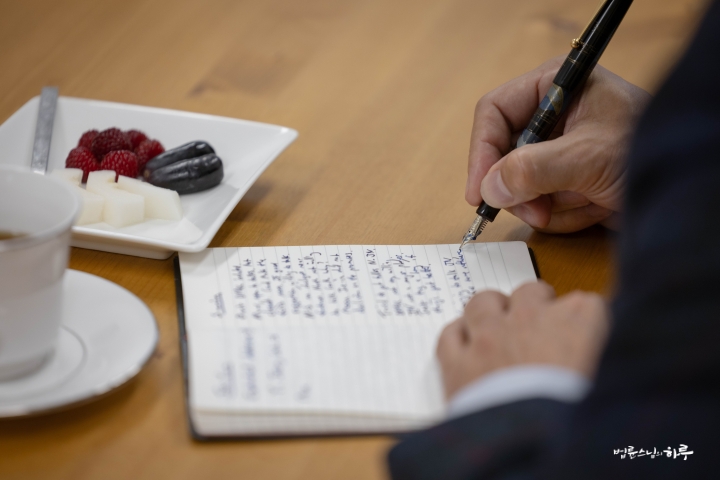
Once an agreement is reached, both sides can establish liaison offices, and the U.S. can continue to verify the nuclear freeze, gradually moving from suspension to lifting of economic sanctions based on what has been verified. North Korea’s request is not for help. They are asking not to be hindered from achieving self-reliance. Therefore, the U.S. doesn’t need to bear any economic burden. The question is whether the U.S. has the intention to improve relations with North Korea in this way. North Korea has the intention to normalize U.S.-North Korea relations.
From North Korea’s perspective, while they have been isolated from the international community, they have now formed a military alliance with Russia, and the UN Security Council is divided, so things cannot get worse than before. Therefore, they will not be desperate for dialogue with the U.S. However, to escape poverty, they still need to improve relations with the United States. So there is still room for negotiations to succeed.”
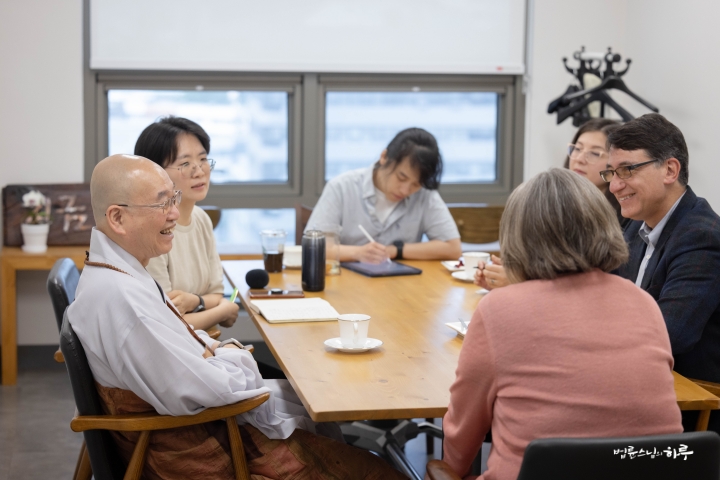
Mr. Januzi actively agreed with Sunim’s thoughts and continued asking various questions. As they conversed, it became lunchtime. After taking a commemorative photo together, they moved to the dining area.
“Let’s continue our conversation over lunch.” 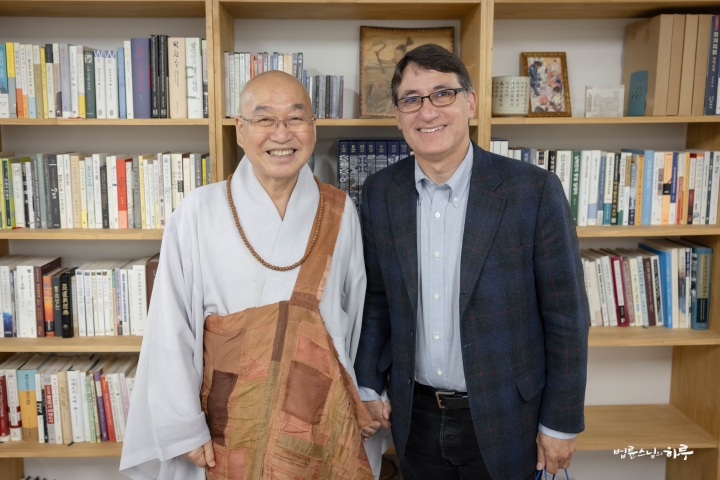
They went down to the basement dining hall and continued their conversation while eating.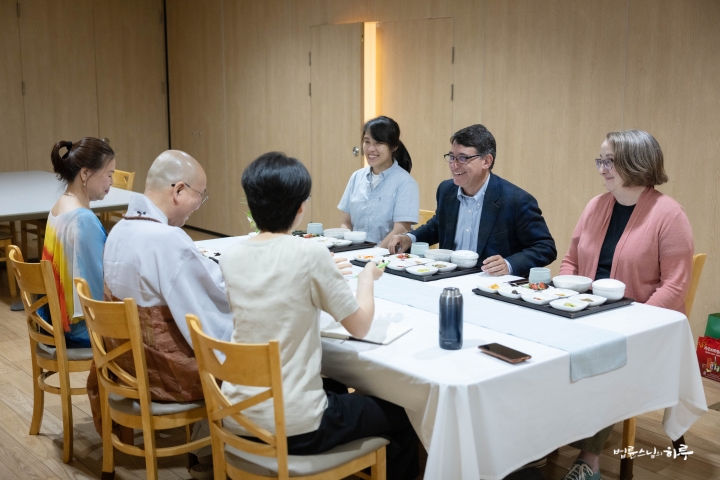
After finishing the meal, they moved to the lounge on the second floor and continued their conversation over tea. Mr. Januzi shared one of his concerns.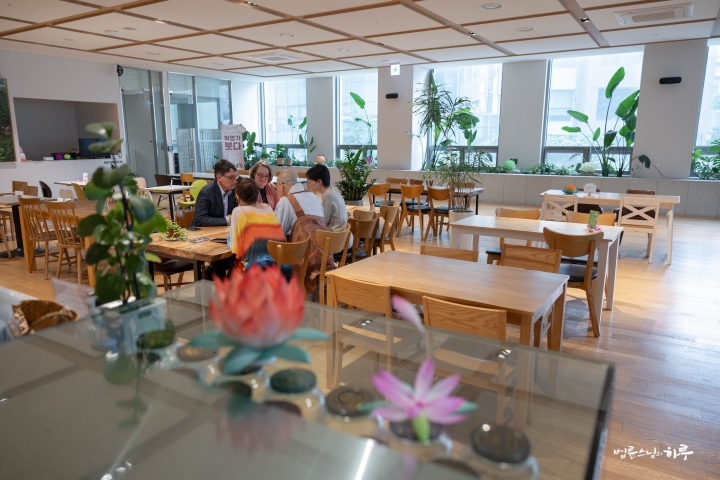
Sunim, You Have Walked for Peace Without Getting Tired. What Is Your Driving Force?
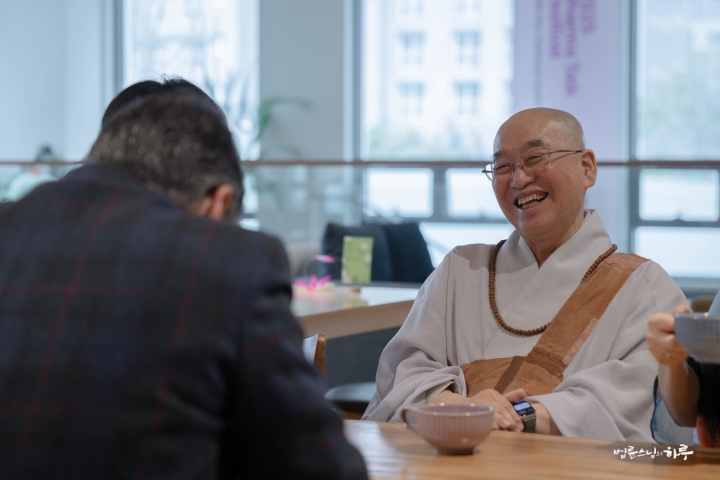
“It depends on whether you view the situation in the short term or long term. In the short term, it’s easy to evaluate something as a success or failure. However, in the long term, you can see it as a process. In other words, everything becomes practice. There is no success or failure in practice. It’s like when we practice basketball – whether the ball goes in or not, we pick it up and throw it again. That’s why, in the long term, it’s just a passing process. For me too, in the short term, everything has been a failure. I’ve rarely experienced success. But in the long term, I’m steadily moving toward success. So there’s no need to be too concerned about whether each event succeeded or failed. When something doesn’t go as planned, instead of considering it a failure,
if you adopt the perspective of, ‘This way didn’t work, so how about trying it that way?’ then the more ‘failures’ you experience, the deeper your understanding will become. This is what we mean by ‘failure is the mother of success.’ All of humanity’s new developments have been achievements gained through failure. So in the long term, it’s not a problem at all. It’s because we’re too impatient that we keep evaluating success and failure.”
“Those are good words. I will keep them in mind.”
While they were conversing, the next guest arrived to meet Sunim. Sunim promised to meet again when he visits the United States next time and said goodbye to Mr. Januzi.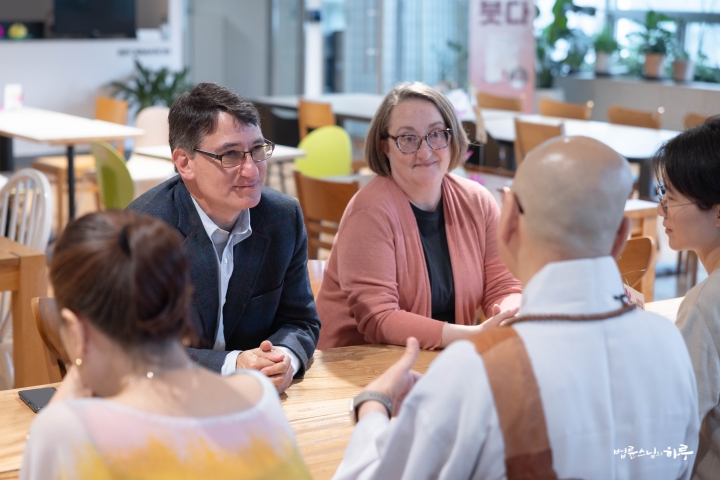
Moving back to the basement dining hall, Director Lynn Lee and her group from NED (National Endowment for Democracy) were waiting for Sunim.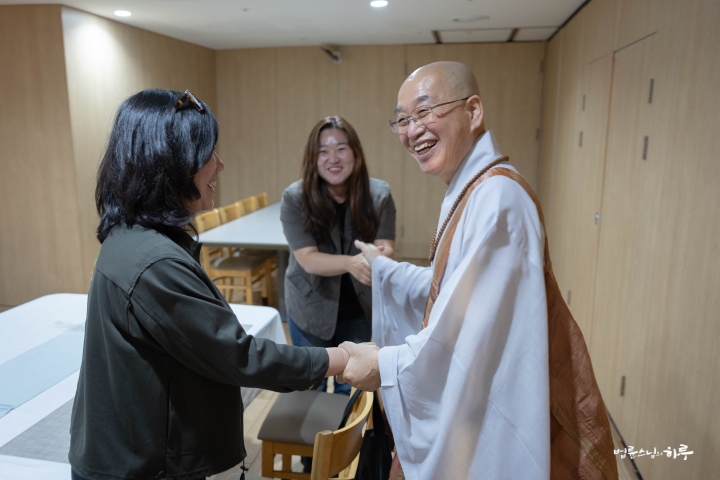
“Nice to see you. How have you been?”
“The U.S. government has recently made massive cuts to federal employees, slashed over 80% of USAID’s budget, and laid off a large number of staff. So NED is also struggling with budget cuts and layoffs.”
“What’s happening with America? They’re firing people as if running a personal shop. If this happened in Korea, there would be demonstrations and chaos. But Americans seem so compliant, just leaving when they’re fired.” (laughter)
“The resistance consciousness seems weak for now. Most people seem to think they can resolve it through legal means.”
While eating, they discussed the current situation in the United States extensively. After finishing the meal, they moved to the Peace Foundation reception room to continue their conversation.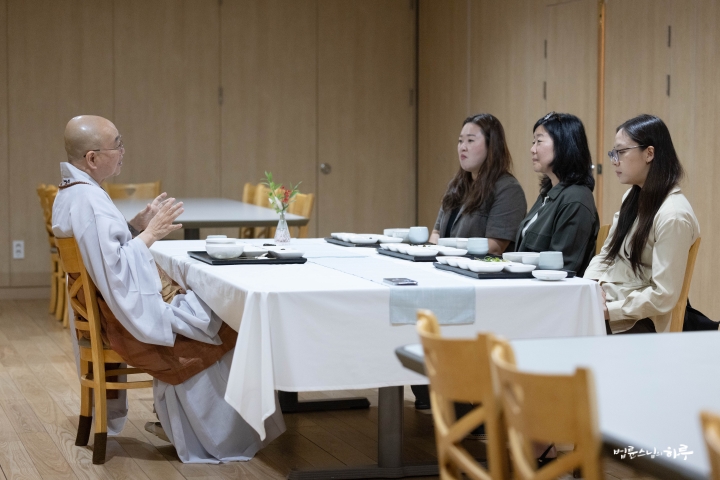
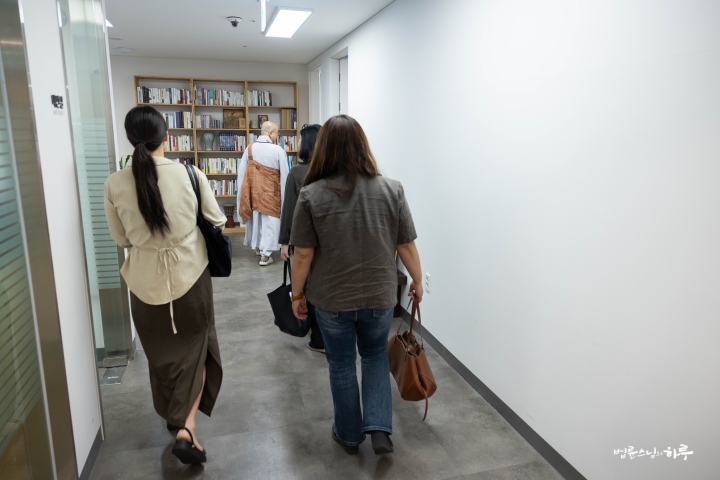
Lynn Lee had helped review English translations for “North Korea Today” published by Good Friends for a year in 2008. Staff members from NED responsible for North Korea and the Asia region also attended.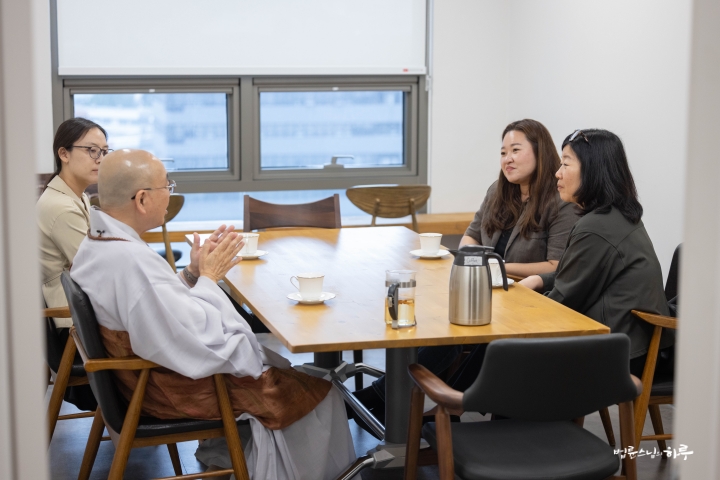
Lynn asked Sunim for various advice on what should be done to improve North Korean human rights and how to resolve U.S.-North Korea relations. Sunim explained with various examples what perspective should be taken to practically improve North Korean human rights.
What Is the Most Realistic Way to Change North Korean Society?
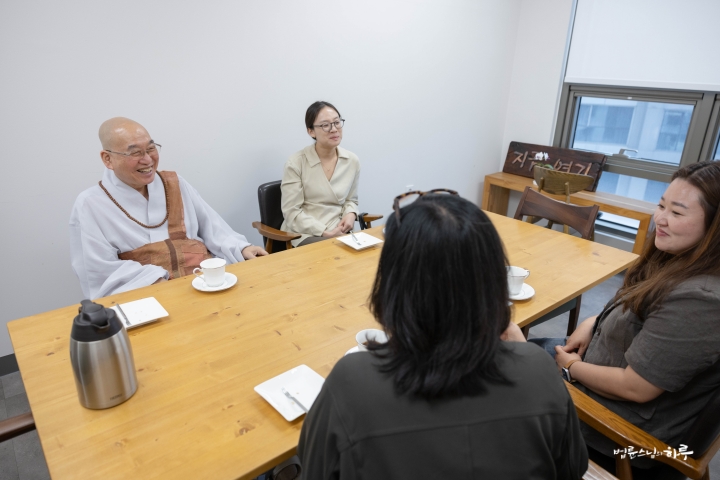
“That’s right. Even if President Trump can’t do anything else, I hope he achieves normalization of U.S.-North Korea relations. Only when North Korean society opens up a little as a result will there be a role for NED to play. I’ve always told conservative groups in South Korea that distributing leaflets criticizing Kim Jong-un has little effect on changing the consciousness of North Korean residents. When North Korean residents pick up and read leaflets with such content, they become terrified. So they have no choice but to burn them, bury them in the ground, throw them away, or run away. Rather, it would be more effective to print and send the rights that residents have according to the Constitution of the Democratic People’s Republic of Korea. There’s no problem for residents to have such content. That’s how real change comes to North Korean residents’ awareness. In our country too, in the 1970s, martyr Jeon Tae-il didn’t claim ‘Down with Park Chung-hee!’ but rather ‘Guarantee labor’s three basic rights!’ and died for it. Female factory workers could also advocate for labor’s three basic rights together. Even when conducting human rights movements, we need to focus on content that residents can accept.
Most North Korean residents faithfully do what the party tells them to do, but there’s one thing they resist even when police try to suppress it. When authorities crack down on selling goods at markets and confiscate them, people fight back desperately. So I think we should start by improving what residents actually need.”
After listening to Sunim’s story, Lynn recalled her volunteer experience at Good Friends and shared the emotions she felt at that time.
“The content I read while publishing ‘North Korea Today’ when I volunteered at Good Friends has been a great help in my current activities. I’m truly grateful.”
After two hours of conversation, Sunim promised to meet again. Lynn expressed concern about Sunim using budget airlines.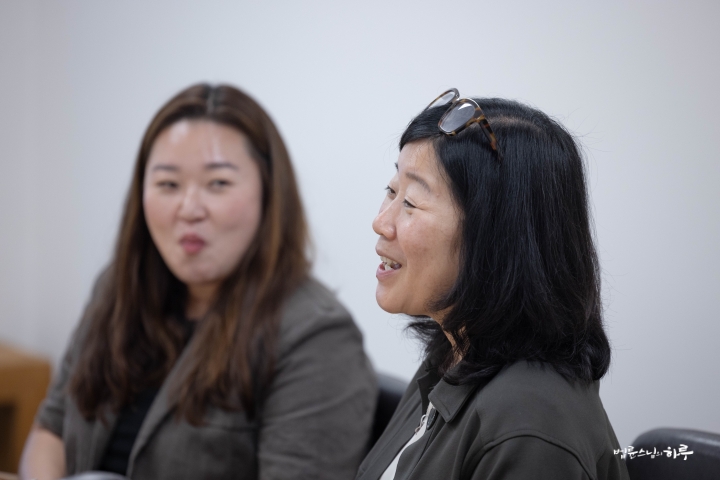
“I’m flying to the United States tonight. I’m going to meet some people regarding Korean Peninsula peace issues. Let’s meet again when I visit the U.S. next time.”
“Sunim, you’re getting older now, so I hope you’ll use business class when flying. You need to rest even on the plane to recover your health. Young people get criticized for flying business class, but no one would criticize you for it.”
“Far from business class, I often fly budget airlines. If business class made the plane arrive faster, I’d be willing to use it. But since the arrival time is the same, I don’t see any need to pay more for business class. Why pay more when we arrive at the same time? Does only business class arrive faster?” (laughter) 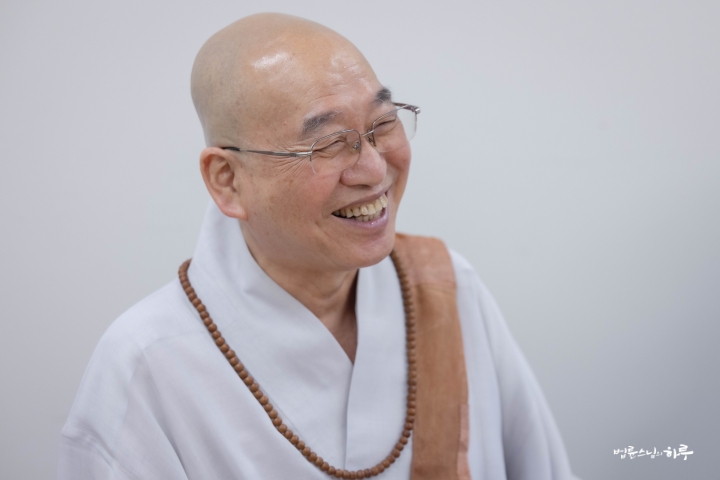
“But you can lie down and rest. And you save time by not having stopovers.”
“I don’t feel the need for that either because I can work at the airport as much as I want.”
“You can be active while waiting.”
“I do a lot of work while waiting at airports. Yesterday, I finished proofreading manuscripts while waiting at the airport. Especially when flying at night, it’s very effective – I can travel and sleep at the same time. JTS has a principle of minimizing operating expenses and delivering almost all of the donations from supporters to relief recipients.” (laughter)
After finishing the conversation, they took a commemorative photo together and said goodbye to Lynn.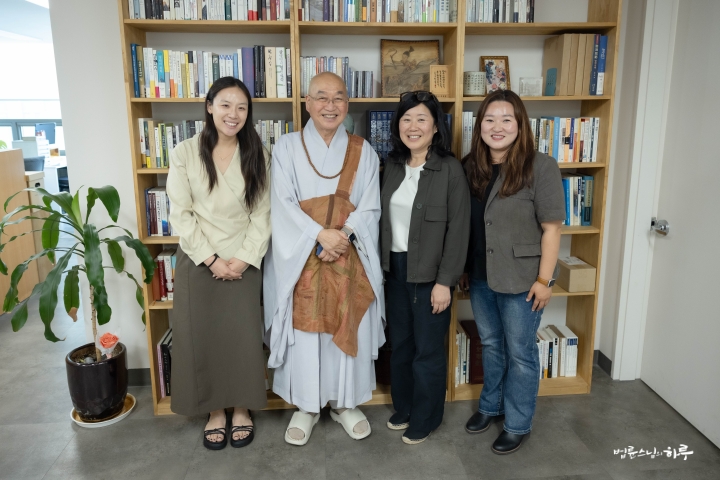
Sunim headed back to the broadcasting room at Seoul Jungto Center. From 4:20 PM, he had a Dharma Q&A session with Gyeolsa Practitioners and Dharma Teachers who were in Jaja training. Through repentance and Jaja, they could ask questions about precepts and realign their perspectives.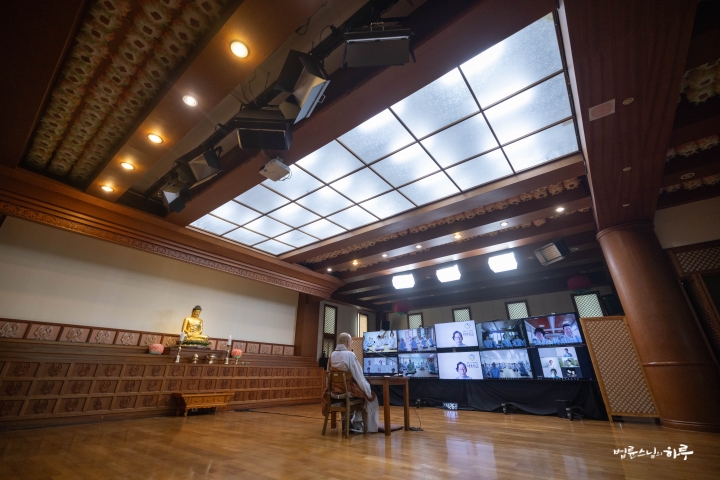
One Dharma Teacher expressed concern about whether the role of Jungto Dharma Teachers might be diminishing as more people seek counseling from artificial intelligence (AI).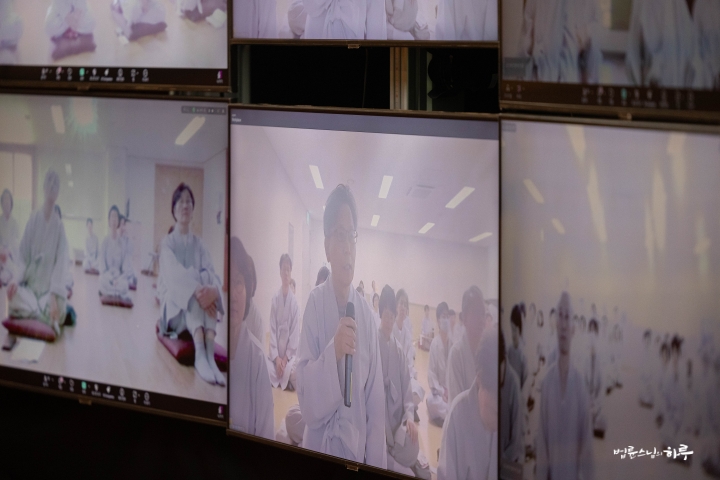
In an Era of AI Counseling, What Role Should Dharma Teachers Play?
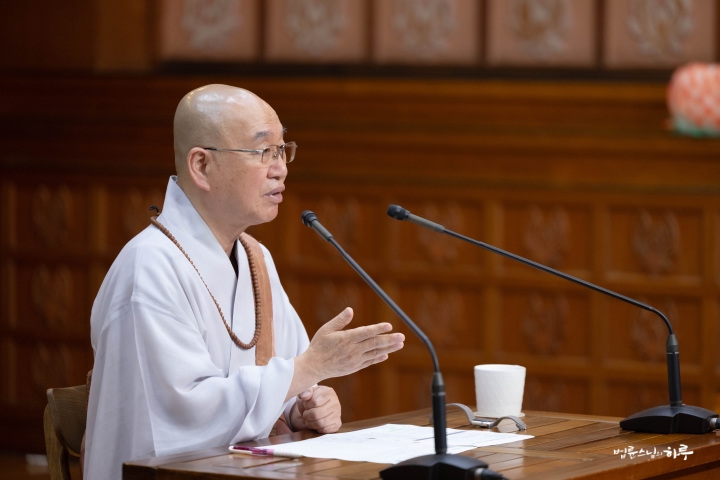
“Any technology developed in this world has side effects proportional to its convenience. Similarly, when we follow our desires, pleasure follows, but so does an equal amount of suffering. To eliminate suffering, we must also give up pleasure. You choose what is beneficial for you. Likewise, AI inevitably has side effects proportional to its convenience. At first, people might find that asking AI helps organize their thoughts well, but gradually becoming accustomed to asking AI and making decisions based on its responses will cause them to lose their ability to make decisions independently. Then the danger arises that the master of your life becomes not you but AI.
For example, suppose Venerable Pomnyun Sunim always says, ‘You must be the master of your own life. So live independently!’ But if you live relying only on Sunim’s words because they sound good, you eventually lose your independence. That’s why when someone asks me a question or submits documents for approval, I always say, ‘Write your opinion first before submitting for approval.’ If someone first says, ‘How about doing it this way?’ then I respond with either ‘No, do it this way’ or ‘Yes.’ When you train by establishing your own opinion first when submitting for approval and then receiving feedback, you get a sense of what perspective Sunim has in proceeding with that project. Only by practicing independently like this can you develop decision-making ability, but if you keep depending on others, you eventually develop a habit of dependence. The habit of dependence risks long-term side effects.
I think it’s actually good that Dharma Teachers aren’t getting questions thanks to AI. Because people asked AI and understood their own problems themselves. Who they asked isn’t important. If no one asks Dharma Teachers questions, Dharma Teachers can do other work. I don’t think you need to worry too much about it. 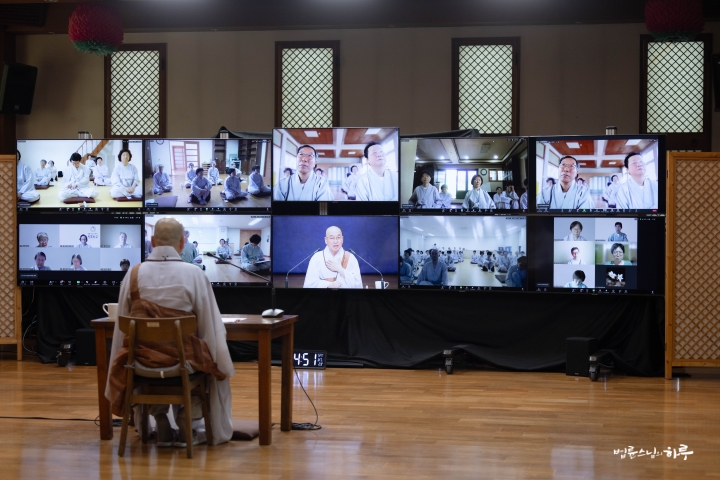
When students from the Jungto Dharma School ask if they can consult with AI, you can tell them to try it themselves and if they find it helpful, then they should use it. This is the inevitable direction we’re heading anyway. In the past, people gained knowledge through the experiences of their seniors. Later, when encyclopedias appeared, people stopped asking others and started looking things up in books. These days, people don’t even read books anymore – they just search on Google. Recently, even Google searching has become too bothersome, so people directly ask ChatGPT. Rather than debating whether this phenomenon is good or bad, we should understand it as a social trend. In this world, there are people who look things up in encyclopedias, people who search on Google, people who use ChatGPT – there’s a diversity of people. Young people will likely think ChatGPT is fast and saves time.
However, while I’ve tried looking things up in encyclopedias or searching on Google, I haven’t yet attempted to find information using ChatGPT. But the staff members around me, whenever I ask them something, use ChatGPT to find information much faster than I could. With search engines, if you don’t enter the exact search terms, you won’t get answers, but ChatGPT understands even when you speak roughly, making it more convenient. Convenience isn’t necessarily bad. In the past, people did mental arithmetic or used abacuses, but we don’t think people’s minds have deteriorated just because they now tap on calculators. While technology can be useful when used appropriately, the risks still remain. 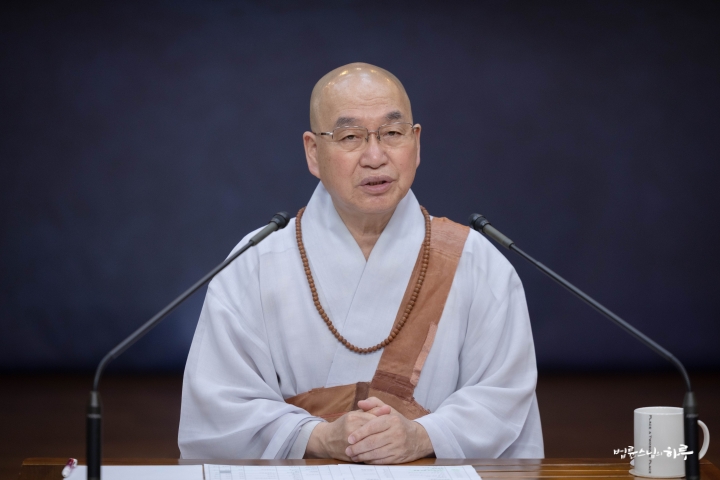
I’m not using ChatGPT, so I’m not aware of what risks there might be. When you input information, there could certainly be security issues. If we keep providing our physical information for the sake of convenience, there’s a possibility it could be misused. For example, if a third party obtains weaknesses like blood pressure or health information, they could use that information to frame someone or cause harm. Especially for politicians, the burden is significant when their illnesses or physical weaknesses are made public. When biometric or personal information is entered into ChatGPT, the data eventually ends up being leaked externally. People using ChatGPT need to discuss whether protecting information is more important or convenience is more important. The reason government agencies are prohibited from using DeepSeek, a Chinese AI, is also for security reasons – because information flows into China. Going forward, Jungto Society also needs to decide whether to use it while accepting the risk of information exposure, or whether to use it with certain restrictions. We should seek advice from various experts to make this decision. The decision will vary depending on what Jungto Society is trying to do and what risks it’s willing to take. Since I don’t know in detail to what extent information is leaked externally, I think it’s necessary for those involved to discuss this thoroughly and establish standards for what level of use would be appropriate.”
“Thank you. I understand well.”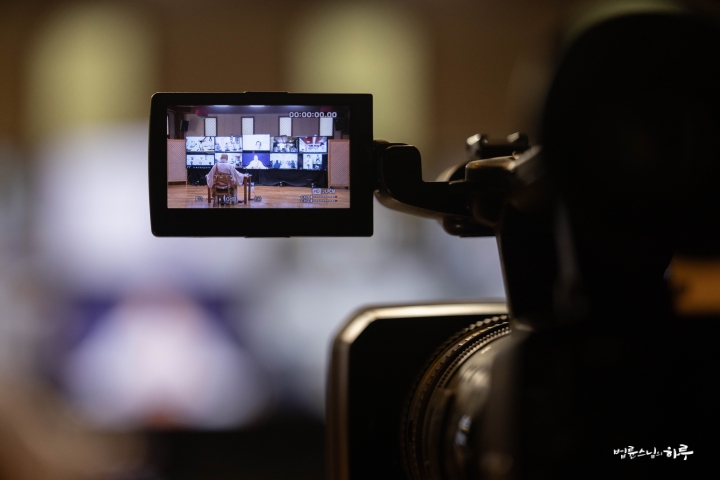
Questions continued to follow.
Being older and in poor health, my posture isn’t proper during online classes, and I need to wear hearing aids during offline activities. How should I manage my feelings of being withdrawn?
For Happy Citizens, we only guide them through reading the Words for Practice and 3-minute meditation. This alone has limitations for deepening practice. What perspective should we have?
I have severe cold hands and feet syndrome and am receiving treatment. The oriental medicine clinic recommends drinking wine before bed as a treatment. Is this okay for a Dharma Teacher?
During Jaja, when I receive criticism without specific examples, I end up responding as if making excuses. I feel unsatisfied – what perspective should I have when receiving Jaja?
During Jaja, sometimes I wonder whether I should or shouldn’t say something to the other person. In such cases, what perspective should I have when pointing things out to others?
I’d like advice on how to conduct Jaja practice – should we do it by division, separate Gyeolsa Practitioners and Seowon Practitioners, or separate Dharma Teachers?
When I try to speak honestly, it seems like I’m being stubborn, but when I try not to be stubborn, it seems like I’m not being honest. How should I maintain balance in my practice?
After receiving various questions and having conversations, it was nearly 6 PM.
Sunim apologized, saying he needed to leave for the airport soon but hadn’t packed yet due to meetings all day, and concluded the Dharma talk.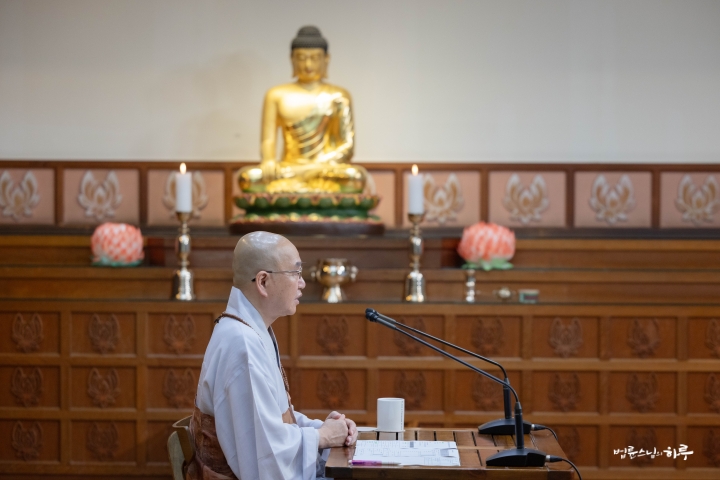
“I’ll ask the Head Dharma Teacher to give the closing Dharma talk, and I’ll take my leave now. I’ll fly to Washington D.C. tonight to meet with various people for peace on the Korean Peninsula and then return.”
After leaving the broadcast room, Sunim immediately packed and headed to Incheon Airport. The Dharma Teachers who had finished their Jaja practice came out to the courtyard to bid farewell to Sunim.
“Sunim, have a safe journey on your long trip.”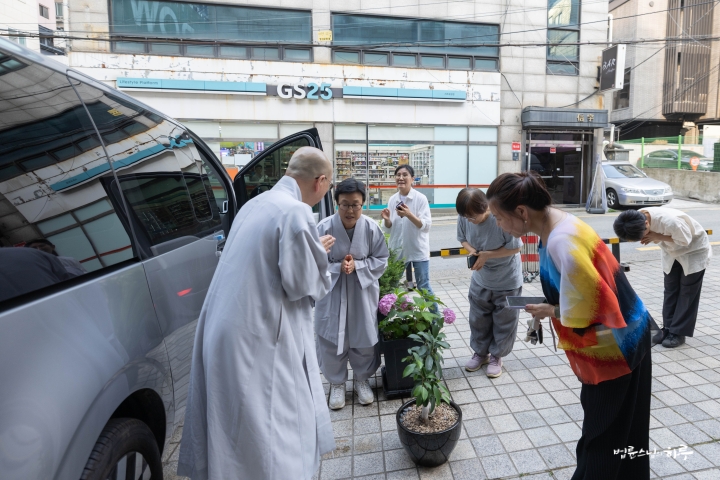
After a 1.5-hour drive to Incheon Airport, he checked in his luggage and went through departure procedures. While waiting at the gate, he worked on manuscript editing before departing from Incheon Airport at 8:55 PM for the United States.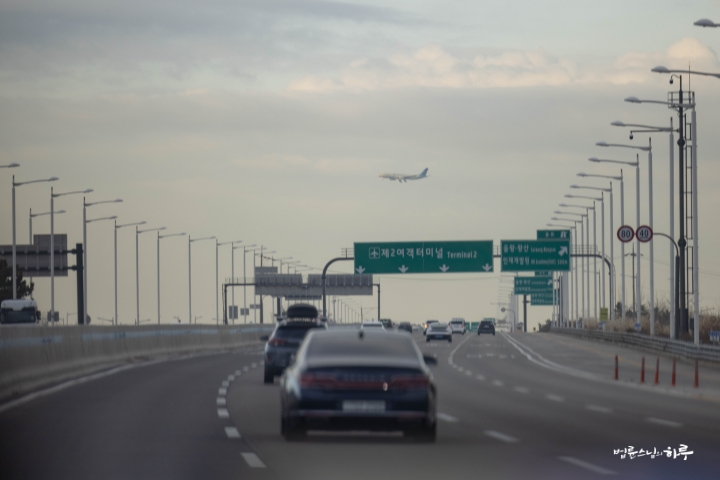
Tomorrow, he will arrive at San Francisco Airport, the transit point, at 3:30 PM local time, wait for 5.5 hours, then transfer flights and depart San Francisco Airport at 9 PM to arrive in Washington D.C. in the early morning. In Washington D.C., he will spend 3 nights and 4 days meeting with U.S. Congress members, government officials, and think tank representatives for peace on the Korean Peninsula.



